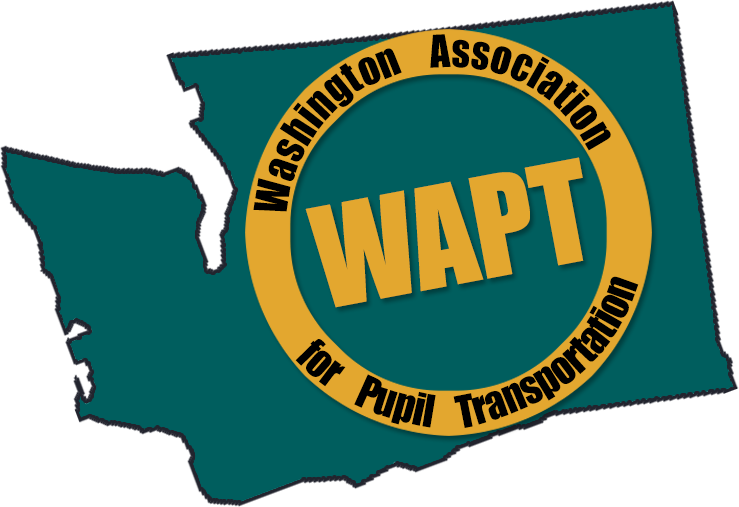 | Washington Association for Pupil Transportation |

Legislative Priorities
WAPT Legislative Priorities – 2025
Transportation Safety Net
The Office of Superintendent of Public Instruction (OSPI) has adopted, as part of the superintendent’s legislative decision package, a request for an additional $50 million for “Transportation Safety Net”. This would be additional funding available to districts with demonstrated “excess costs” for the transportation of Special, Homeless and Foster category students. This would be funding available through the Transportation Safety Net application process. WAPT supports this additional funding.
Regional Transportation Coordinator Grant
OSPI has adopted, as part of the superintendent’s legislative decision package, a request for an additional $181,000 in FY 2026, and an addition of an annual factor to systematically increase the grant to account for cost-of-living increases. The Regional Coordinator grant is a line item budget proviso that provides $939,000 for all costs associated with the five Regional Coordinators. The proviso has remained the same since 2019. As a result Regional Coordinators have reduced travel, and other operational costs to stay within the allocated amount. This has resulted in a reduction in district site visits, conference attendance and professional development activities that help coordinators provide service to districts.
WAPT supports adequate funding for Regional Transportation Coordinators to continue to serve the districts and students of Washington.
The following legislators can be contacted regarding the RTC Grant enhancement:
Representative Steve Bergquist
Senator June Robinson
Representative Mia Gregerson
Senator Lisa Willman
ACT-Advance Clean Truck Rule
In 2021 the Washington Department of Ecology adopted California Air Resources Board (CARB) standards. These Standards have multiple different components, the ones that affect the School Bus market directly are the Omnibus, and ACT (Advanced Clean Truck) measures. Omnibus refers to the emissions of the bus and ACT limits sales of new diesel vehicles in the State of WA. The ACT standard requires that a percentage of vehicles sold in Washington be zero emission, starting with the 2025 model year. The ACT rule requires an increase in the sales of zero emission medium and heavy-duty trucks in the state.
This rule will severely limit school district’s ability to purchase buses to meet the unique geographic needs of the 295 school districts in the state. Electric school buses are not practical in all applications. This rule will significantly limit the ability of districts to purchase diesel, gasoline, and propane powered school buses, and will increase the cost of those buses when available. The result of this challenge will be counterintuitive and will ultimately cause districts to keep older buses on the road for longer, rather than replacing them with cleaner diesel, gasoline and propane buses.
The Electric Vehicle Council in Oregon (Oregon also adopted the CARB standards) approached the Oregon legislature requesting that the legislature exempt school buses from these rules. This will allow districts to continue to purchase buses that meet the diverse needs of the districts in the state.
WAPT supports a similar exemption in Washington.
Department of Licensing Concerns
School districts nationwide continue to deal with a shortage of school bus drivers, and Washington school districts are no exception. The Washington Department of Licensing (DOL), Commercial Driver’s License (CDL) section is making it increasingly more difficult for school districts to accomplish the testing needed for school bus driver applicants to obtain their CDL.
These are the significant problem areas:
· DOL has implemented a “Training Provider Registry” and requires school districts to register in their business licensing system as an employer training provider, and bus driver trainers to obtain a professional license as an employer trainer. This is a significant administrative burden on school districts, as the system is cumbersome and difficult to navigate. It is also difficult to obtain support, leaving districts without the ability to obtain needed testing for weeks. This process is a redundant process. The Federal Motor Carrier Safety Administration also has a similar (but simpler) training provider registry that districts are required to join. There is no federal requirement for states to have a “look-alike” system. Washington DOL’s process is unnecessary, and a waste of state resources.
· RCW 46.25.060(1)(d) and (1)(e) limits the cost of a CDL skills test for a school bus driver to $100. Certified testers can charge up to $250 for a CDL skills test for other commercial vehicles. This has resulted in a reduction of Third Party CDL skills testers, and difficulty scheduling a school bus test with the remaining testers. Public school districts train and test approximately 2,000 new school bus drivers every year.
Without a resolution to DOL’s excessive regulation, districts will continue to lose new trainees, further exacerbating the school bus driver shortage and the reliability of transportation services.
WAPT asks the legislature to intervene to require DOL to rescind rules that create duplicate requirements for employers to follow.
ESHB 1699 – Retire/Rehire
In 2022, the legislature realized that a shortage of school employees existed, including school bus drivers. As a result, in the 2022 session, ESHB1699 was passed and signed into law, increasing the annual limit of hours a retired school employee could work in a school district without affecting their retirement. This law sunsets July 1, 2025.
WAPT supports a reauthorization of this law, so that school bus drivers who are currently driving for school districts under this law can continue to drive.